Eye On '07: PC
A truly promising Vista.
With the flurry of next-gen excitement in the console market over the last couple of years, it's easy to forget that the PC has also continued to evolve at a spectacular pace - and is already trotting out many of the "next-gen" experiences which we're still waiting for the Xbox 360 and PS3 to provide. It's an exciting - if rather expensive - time to be a PC gamer, and of course the platform gets its own major upgrade early this year when the much delayed Windows Vista finally appears. The new OS may not be of much interest to gamers, but DirectX 10, which accompanies it, certainly is - and towards the end of 2007 the hugely impressive PC games we're seeing now will be superceded by even better looking titles using the new API features. Let's take a look forward.
Eurogamer's Top Picks
Crysis
- Developer: Crytek
- Publisher: EA Games
- PC Exclusive
- Gamepage
Looking now at the various iterations of Far Cry, the first game from German developer Crytek, it's easy to forget just how jaw-dropping the game was when it appeared - with sprawling island environments and visuals that seemed a whole generation ahead of the competition. We're reminded of this when we look at Crysis, a game which is hands-down the most visually advanced videogame currently in development. Seen in still shots, it's a stunning leap towards photo-realism; seen in motion, it's even more impressive, with a myriad of tiny but crucial physics interactions building up scenes more believable than anything we've witnessed before on any platform.
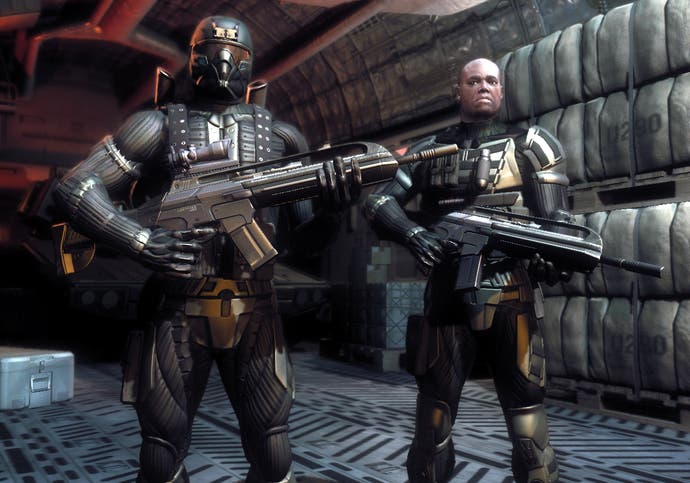
Crysis is far more than just a pretty face, though. The eminently realistic behaviour of everything from foliage to weather, from water and ice to bullets and enemies, is finely tuned not only to look good but also to have a bearing on how you play the game. The beautifully detailed shadows affect how easily enemies can spot you; the ability to knock the flora of the islands around manifests in creative ways to take down enemies or block their lines of fire. No game has ever been so ambitious in the number of ways it offers players to interact with the environment.
The ambition of Crysis doesn't end there, either. The conventional start of the game, which sees you fighting enemy soldiers around a Pacific island, is quickly replaced by a battle against intelligent, bio-mechanical dinosaur-esque horrors, and eventually you'll end up fighting in zero gravity environments where full Newtonian physics means every gunshot will have to be carefully measured. Call us optimists, but we can't help but wonder if the team at Crytek are about to become the first people to significantly lift the bar set by Half-Life 2. We certainly hope so.
Enemy Territory: Quake Wars
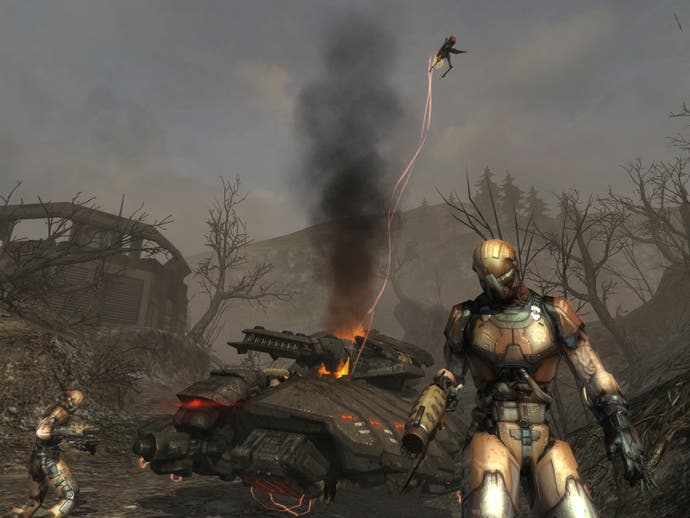
- Developer: Splash Damage
- Publisher: Activision
- PC Exclusive
- Gamepage
After the poorly received Battlefield 2142, it's probably worth going to some lengths to point out what this isn't - it isn't Battlefield married to Quake, despite initial impressions. Instead, the British team at Splash Damage are building a multiplayer-focused game which combines the accessibility of Quake and its ilk with team-focused, objective-oriented matches which owe much to the likes of Team Fortress and, of course, Splash Damage's own hugely popular Return To Castle Wolfenstein mod, Enemy Territory.
While perhaps not a graphics showcase, Enemy Territory definitely looks great - but far more important than that is the focus on balancing two very different forces, the humans and the Strogg. Rather than providing reskinned carbon copies of the same units, the team has created vastly disparate sides, and players will have to learn entirely different strategies in order to switch sides, which should add greatly to the longevity of the game. Moreover, the game should be enjoyable even for those who aren't in organised clans, since it dispenses with the commander class used by many other tactical, team-based FPS games and instead allows players to take independent actions which they coordinate with their team-mates, rather than waiting for orders from above.
All the ingredients are in place for one of the most interesting online games since Battlefield 1942, or even Counter-Strike - a range of classes which are easy to learn but whose subtleties will take ages to master, vehicles and deployables to spice up the battlefield and provide focal points for players, team-play which looks set to strike a fine balance between being pointless (thus encouraging lone wolf behaviour) and being so essential that a few bad eggs can ruin your entire team. More accessible than Battlefield, more extensive and varied than Counter-Strike - every few years a game emerges which dominates the PC online landscape, and we've got a strong feeling that Enemy Territory's turn in the limelight is next.
Hellgate: London
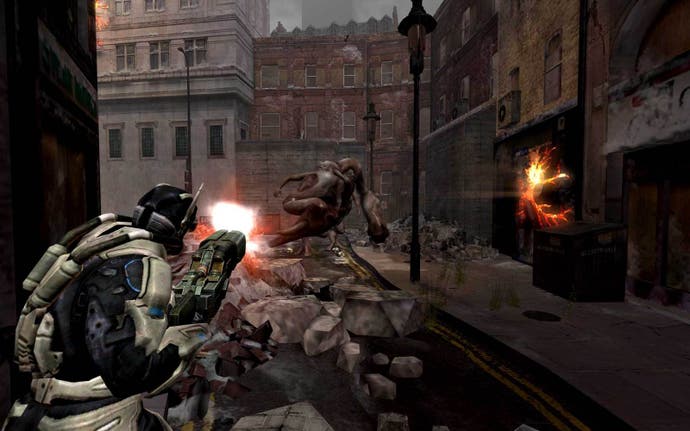
- Developer: Flagship
- Publisher: Namco / EA
- PC Exclusive
- Gamepage
It may be a new company, but it's no surprise that Flagship is attracting plenty of attention - after all, it's made up largely of Blizzard veterans who count some of the best-loved PC games of all time among their creations. Chief among them is Bill Roper, whose CV includes senior roles on Warcraft, Starcraft and Diablo - and having spent countless hours on those franchises, not to mention having seen how he's basically treated like a walking deity in South Korea, we're not about to question those credentials.
Besides which - Hellgate: London, Roper's first game since leaving Blizzard, looks fantastic. As the title suggests, the game has a particular resonance for gamers in the UK, since you'll be battling your way through the post-apocalyptic streets of London, where idiot tourists who stop suddenly in the middle of crowded pavements, annoying mothers pushing prams the size of Humvees down Oxford Street and insane street preachers banging on about sinning and winning have been replaced by all manner of demons and hellspawn. Believe it or not, this is actually worse than the present situation, so humanity is forced to take refuge in Tube stations and tunnels - and Templar knights with weapons and powers that fuse magic and technology have to fight back.
The game owes much to the Diablo series in terms of its heritage, but unlike Diablo, it's gorgeous 3D environments all the way - and while the combat is largely focused on your stats (it's very heavily slanted in the RPG direction), some modicum of skill in aiming and so forth will also be required, especially for the Hunter class, which was added to give FPS fans something to get their teeth into. A variety of interesting classes and skill upgrades complete the picture - for now, at least, because Hellgate is seen as being the start of a pretty major franchise. More massive Blizzard-style franchises with sprawling back-stories and astonishingly solid, balanced and well-considered core gameplay? Now there's something everyone can enjoy.
Spore
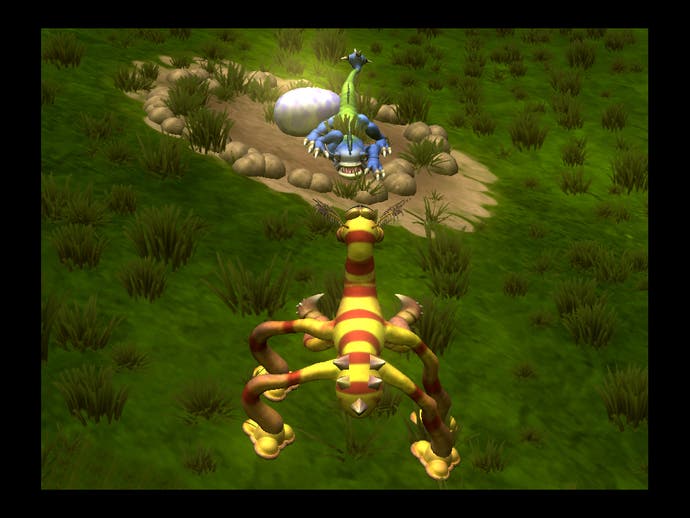
- Developer: EA
- Publisher: EA Games
- PC Exclusive
- Gamepage
Will Wright is the game designer's game designer - a true creative genius who devours scientific and academic texts and distils their concepts into interactive titles with grand scope and near-perfect execution. Even by his own lofty standards, however, Spore is an astonishingly ambitious title; one which takes the concept of the "god game" further down the road towards its logical conclusion than ever before. Players are given control of evolution itself, quite literally working upwards from a single spore to the management of advanced life forms - doing for the entire story of life itself what Civilisation did for the story of human history, in effect.
Will that yield a game which is actually fun? Almost certainly; Wright may be fascinated by the science which underlies his creations, but he's a game designer through and through, and his real genius lies in his ability to take complex fields like city planning and economics, or sociology and human interaction, and turn them into astonishingly addictive games like Sim City and The Sims, respectively. Already we're particularly intrigued by the idea of sharing our Spore creations with friends and watching them interact, and like all Wright's games, we expect there to be plenty of other fascinating elements which will keep us up long past our bedtimes.
Perhaps the most amazing thing about Spore is that it's being made at all - it's a game concept so alluring, complex and beautiful that it's an astonishing testament to Wright's influence that it has survived the harsh economic realities of game development. Doing a little crystal ball gazing, we also predict that it could be the game at the heart of one of the most peculiar mass-media outings ever for videogames; a game allowing the player to command evolution itself could not be appearing at a more controversial and fractured time in the United States, and it could be fascinating to see what happens if the loony fringe of Creationism and Intelligent Design get their hands on the game. Videogame news headline writers across the land are undoubtedly rubbing their hands in pre-emptive glee already.
Supreme Commander
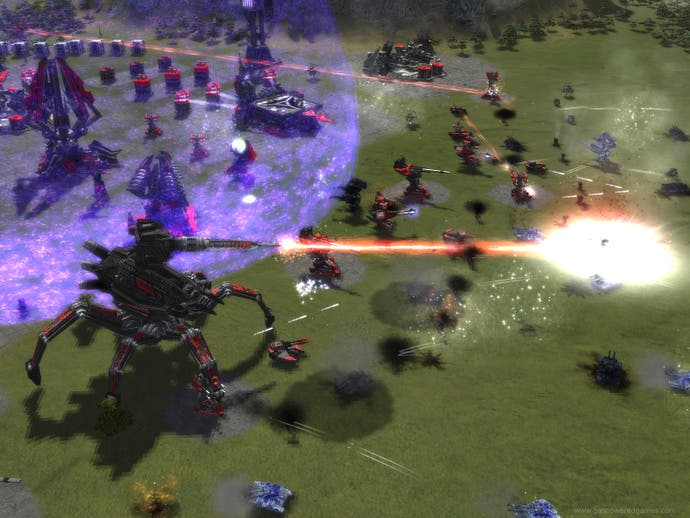
- Developer: Gas Powered Games
- Publisher: THQ
- PC Exclusive
- Gamepage
Designer Chris Taylor is best known as the man behind Total Annihilation - one of the finest strategy games of its time, or indeed of any time. When he named that game, he wasn't kidding; most decent games of TA left the entire map smouldering, burning, and horribly scarred. It transpires that when he decided to call his new game Supreme Commander, he wasn't kidding about that either; this game promises maps of such epic scale that a new zoomed-out view which replaces entire army divisions with icons has been invented to allow players to create effective, all-encompassing strategies as well as managing their armies' combat at a fine detail level.
Perhaps the finest achievement of Supreme Commander is that the game will be instantly familiar to RTS fans - who will appreciate the slick interface and controls, as will newcomers to the genre - but quickly makes it apparent that this is not a game where the old rules apply. Creating strategies which span entire continents calls for a whole new approach from players, and Taylor's instinct for game balance and ensuring that every single unit on the map is crucial in its own way ensures that the range of strategies available to players will be almost limitless. Already we're hearing about the end of the ages-old tank rush strategy, the newfound importance of naval units, and the need to balance short-term tactics with a coherent long-term strategy - a whole new world for RTS gameplay.
If you're a fan of the RTS genre, this game looks like it's about to change your world, and if you're not a fan of RTS, it may well be the ideal entry point. In a genre which hasn't lacked for excellence in the last 12 months, Supreme Commander is still a prospect which stands head and shoulders over the rest of the battlefield.








